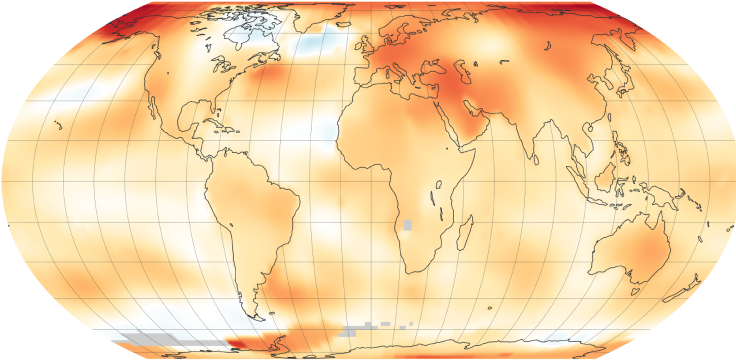NASA, NOAA Experts To Release Assessment Of 2019 Global Temperatures And Climate Trends
KEY POINTS
- NOAA and NASA experts will announce their annual assessment of 2019 global temperatures
- The announcement will be made at the 100th American Meteorological Society Meeting
- In 2018, global temperatures were 0.79 to 0.83 degrees Celsius above the 20th century average
NASA and the National Oceanic and Atmospheric Administration (NOAA) experts are set to announce their assessment of 2019 climate trends this week.
Why should we care about annual global temperatures and climate trends?
NASA, NOAA Announcement
NASA and NOAA are two of the world’s keepers of world temperature data, both independently producing records of changes in the Earth’s temperatures each year. On Wed., Jan. 15, experts from both agencies will be announcing their annual assessment of the global temperatures and major climate trends observed in 2019.
Consistent data from the two agencies as well as from other countries increases the confidence in the accuracy of assessments and informs governments and businesses when it comes to critical climate-related decisions.
The announcement will be made during a media teleconference at the 100th American Meteorological Society Annual Meeting.
NASA’s Gavin Schmidt and NOAA’s Deke Arndt will participate in the teleconference, which will be streamed live via NASA TV.
Global Temperature Trends
Evidence from all around the world shows that global temperatures have steadily risen since the Industrial Revolution. In fact, NASA data shows that global temperatures have increased by 0.8 degrees Celsius since 1880, with two-thirds of the increase occurring since 1975.
But why should we care about global temperatures? That’s because it takes a significant amount of heat to warm the planet even by just a single degree, and just two degrees of increase is already an unusual event in Earth’s recent history.
In fact, although two degrees may seem like a small amount, even small global temperature changes can cause vast environmental changes. Take, for instance, the last Ice Age. Back then, the Northeast United States was covered in over 3,000 feet of ice, but the global temperatures were just three to five degrees colder than now.
Effects
Today, increases in global temperatures have already caused ice glaciers to shrink, river and lake ice to melt earlier, and even plants to bloom earlier. Other effects include more frequent and severe wildfires, longer periods of drought, accelerated sea-level rise, intense heat waves, and increases in the number, severity, and intensity of tropical storms; events that we are already witnessing in many parts of the world.
According to the Intergovernmental Panel on Climate Change, evidence shows that such damages as a result of climate change will likely be significant and will even increase as time passes. These events will affect people all over the world, with many nations being more vulnerable than others.
So far, 18 of the 19 warmest years on record have all occurred since 2001. As of 2018, global temperatures were 0.79 to 0.83 degrees Celsius above the 20th-century average, making it the fourth warmest year since 1880.

© Copyright IBTimes 2025. All rights reserved.






















